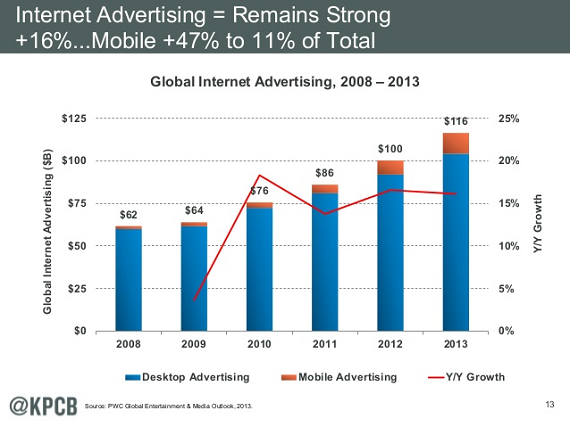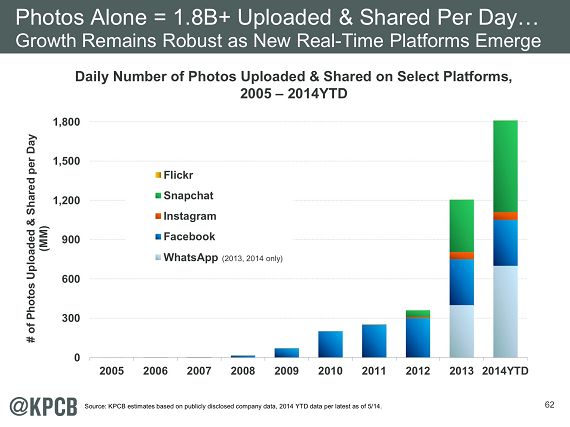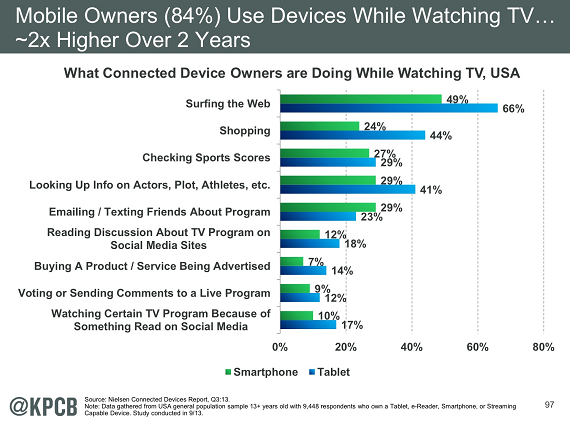
Every year, KPCB partner Mary Meeker releases her Internet Trends report, with insights that capture the trends in Internet and mobile.
The latest report was put out on Wednesday and here are some of the key takeaways:
- Mobile
The mobile takeover that everyone has been talking about for the last few years is only getting stronger.
While user growth on the Internet is slowing, dipping below 10%, mobile is heating up, especially when it comes to tablets. Mobile data traffic grew 81%, helped, in large part, by video.

While smartphone subscriber growth may be slowing down, there is still a ton of room to grow, as only 30% of the world’s 5.2 billion mobile users currently one a smartphone.

With the rise in mobile data, advertising on mobile devices, which now accounts for 11% of all advertising on the Internet, is not growing anywhere near as quickly. In fact, it seems to have slowed down a bit last year.

- Cyber threats
There has been a significant rise in the number of cyber terrorist groups, as well all know, which now stands at 300, quadruple what it was in 2011.
And over 95% of networks have been compromised. Most recently it was eBay and Spotify that were breached.

- Music consumption
Is the iTunes era over? For the first time, digital track sales actually declined year to year, though streaming is on the rise. No wonder Apple is so interested in buying Beats Music!

- Bitcoin
If you asked me at this time last year what Bitcoin was, I’d have had absolutely no idea. Now there are five million Bitcoin wallets, up from around a million and a half in November of last year, and eight times what they were a year ago.

- Photo sharing
Last year, photo sharing started to seemed so 2012. Then came Snapchat to upend the entire space.
There are now over 1.8 billion photos uploaded and shared every single day. Snapchat, along with Facebook’s newly acquired WhatsApp, make up the vast majority.

- Internet of Things
Predictions that the Internet of Things will be the next big space are coming true. The number of devices equipped with sensors rose 32% year to year, bringing the number up to 8 billion in total.
True, over 6 billion of those devices are cell phones, but they also include wearables, headsets, gaming devices and cameras.

- Second screens
I want to be snarky about this, but I am guilty of it too: I frequently find myself doing things on my phone while watching movies and TV at home. It’s becoming a real problem!
A full 66% of U.S. tablet owners surf the web while watching TV. while another 44% shop online. The urge to use a second screen seems to be less of an issue for smartphone users, but that is probably because of the size of the screen, and not because they have actual attention spans.

- China
China is such a conundrum for Internet giants: there are so many people there, and so many Internet users, yet it is such a hard place to break into, and to do business.
But with numbers like these, I suspect even more of them will try. Mobile Internet users now represent a full 80% of total China’s Internet users. That gives the country more critical mass for mobile web than anywhere else in the world.

The country is also seeing a lot of innovation. Last year, nine of the top 10 global Internet properties came from the United States. This year, it is only six.
In case you were wondering, the companies that fell off were Ask.com, Glam Media and Apple. They were replaced by Alibaba, Baidu and Sohu.

See the full report below:
(Image source: bostinno.streetwise.co)



















